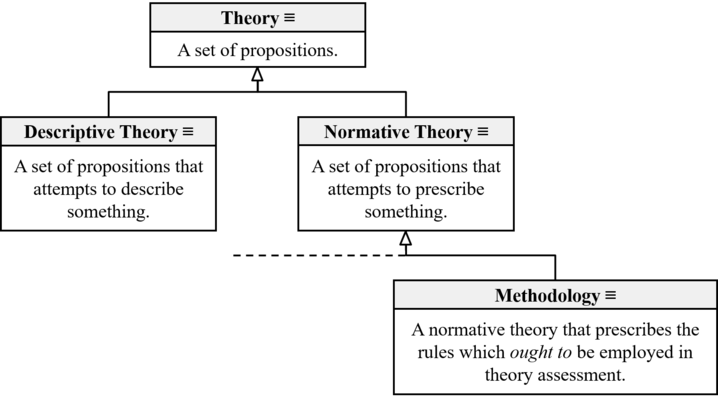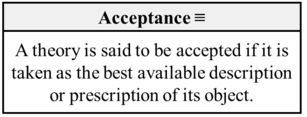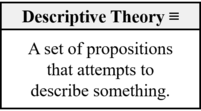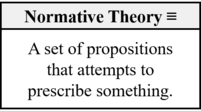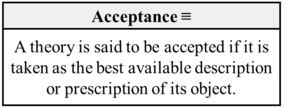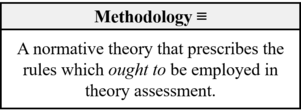Difference between revisions of "Modification:Sciento-2016-0002"
m (→Modification) |
|||
| Line 1: | Line 1: | ||
| − | + | {{Modification | |
| − | + | |Summary=Accept a new taxonomy for ''theory'', ''normative theory'', ''descriptive theory'' to reintroduce normative propositions (such as those of ethics or methodology) to the scientific mosaic. | |
| + | |Year Suggested=2016 | ||
| + | |Resource=Sebastien (2016) | ||
| + | |Authors List=Zoe Sebastien | ||
| + | |Preamble=Currently, a [[theory]] is defined as a set of propositions that attempts to describe something. This definition excludes ''normative propositions'' from the scope of the TSC. Normative theories, such as those of methodology or ethics, have been excluded since including them appears to give rise to a destructive paradox first identified by Joel Burkholder. There are many historical cases where employed [[Method|scientific methods]] are known to conflict with professed [[Methodology|methodologies]]. This seems to violate [[The Third Law|the third]] and [[The Zeroth Law|zeroth laws]] of scientific change. By the third law, employed methods are deducible from accepted theories. But, this seems impossible in cases where methodologies and methods conflict. Under the zeroth law, all elements in the scientific are compatible with one another. But, that seems to be clearly not the case if methodologies and methods conflict with one another. | ||
| + | |Modification=Define ''theory'' as "a set of propositions" and include normative and descriptive propositions as subcategories of theories with methodology as a subcategory of normative theory: | ||
| − | + | [[File:TheoryTaxonomyDiagram_Sebastien_2016.png|center|718px]] | |
| − | |||
| − | |||
| − | |||
| − | |||
| − | |||
| − | [[File: | ||
Modify the definition of ''theory acceptance'' to make it possible for both descriptive and normative theories to be accepted: | Modify the definition of ''theory acceptance'' to make it possible for both descriptive and normative theories to be accepted: | ||
| − | [[File: | + | [[File:Acceptance_Sebastien_2016.png|center|307px]] |
| − | + | |Parent Modification= | |
| − | == Verdict = | + | |Verdict=Open |
| − | + | |Year Assessed= | |
| − | + | |Verdict Rationale= | |
| − | + | }} | |
Revision as of 16:50, 16 August 2016
Accept a new taxonomy for theory, normative theory, descriptive theory to reintroduce normative propositions (such as those of ethics or methodology) to the scientific mosaic.
The modification was suggested to Scientonomy community by Zoe Sebastien on 3 September 2016.1 This modification presupposes the acceptance of Sciento-2016-0001. The discussion was closed on 23 January 2017 and the modification was not accepted. It was superseded by Sciento-2017-0001 and Sciento-2017-0002.
Contents
Preamble
Currently, a theory is defined as a set of propositions that attempts to describe something. This definition excludes normative propositions from the scope of the TSC. Normative theories, such as those of methodology or ethics, have been excluded since including them appears to give rise to a destructive paradox first identified by Joel Burkholder. There are many historical cases where employed scientific methods are known to conflict with professed methodologies. This seems to violate the third and zeroth laws of scientific change. By the third law, employed methods are deducible from accepted theories. But, this seems impossible in cases where methodologies and methods conflict. Under the zeroth law, all elements in the scientific are compatible with one another. But, that seems to be clearly not the case if methodologies and methods conflict with one another.
Modification
Define theory as "a set of propositions" and include normative and descriptive propositions as subcategories of theories with methodology as a subcategory of normative theory:
Modify the definition of theory acceptance to make it possible for both descriptive and normative theories to be accepted:
Theories To Accept
- Theory (Sebastien-2016): A set of propositions.
- Descriptive Theory (Sebastien-2016): A set of propositions that attempts to describe something.
- Normative Theory (Sebastien-2016): A set of propositions that attempts to prescribe something.
- Theory Acceptance (Sebastien-2016): A theory is said to be accepted if it is taken as the best available description or prescription of its object.
- Methodology (Sebastien-2016): A normative theory that prescribes the rules which ought to be employed in theory assessment.
Theories To Reject
- Theory (Barseghyan-2015): A set of propositions that attempt to describe something.
- Theory Acceptance (Barseghyan-2015): A theory is said to be accepted if it is taken as the best available description of its object.
- Methodology (Barseghyan-2015): A set of explicitly formulated rules of theory assessment.
Questions Answered
This modification attempts to answer the following question(s):
- Normative Theory: What is normative theory? How should it be defined?
- Descriptive Theory: What is descriptive theory? How should it be defined?
- Theory Acceptance: What does it mean to say that a theory is accepted? How should theory acceptance be defined?
- Theory: What is theory? How should it be defined?
- Methodology: What is methodology? How should it be defined?
Verdict
The discussion was closed on 23 January 2017 and the modification was not accepted. Since this modification consisted of two interrelated but essentially distinct suggestions - one definitional and one ontological - it was decided by the community to divide it into two modifications so that the gist of the proposed suggestions is properly articulated. In particular, it was agreed that there are two modifications in "the heart of this single modification - one ontological, the other definitional".c1 It was also agreed that the current formulation "is exclusively definitional, and does not give the community an opportunity to appreciate (and, well, accept) the ontological changes that come along with it".c2 Consequently, it was decided to divide this modification into two modifications - one definitional and one ontological.c3
This modification was superseded by Sciento-2017-0001 and Sciento-2017-0002. Click on the Discussion tab for comments.
References
- ^ Sebastien, Zoe. (2016) The Status of Normative Propositions in the Theory of Scientific Change. Scientonomy 1, 1-9. Retrieved from https://www.scientojournal.com/index.php/scientonomy/article/view/26947.
